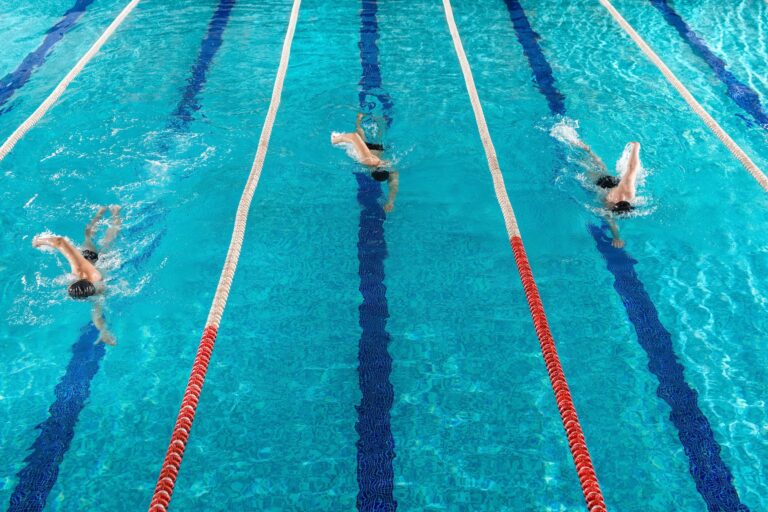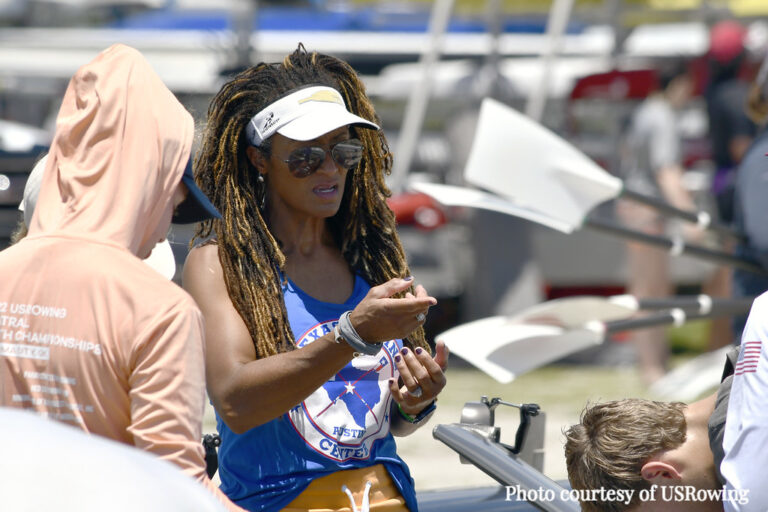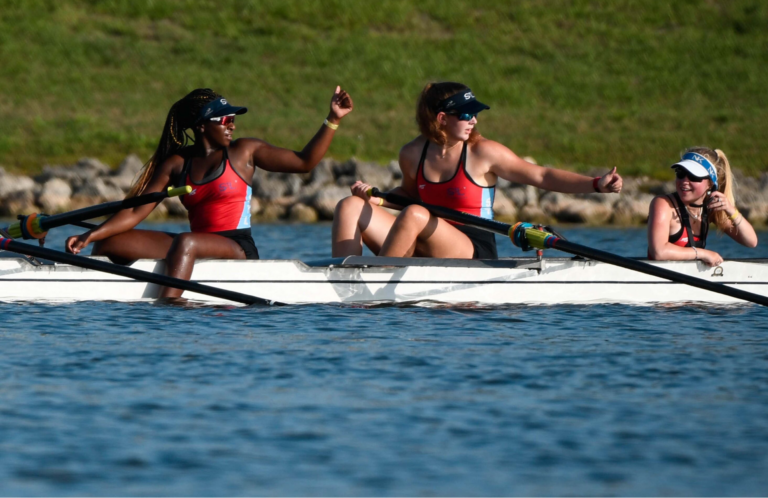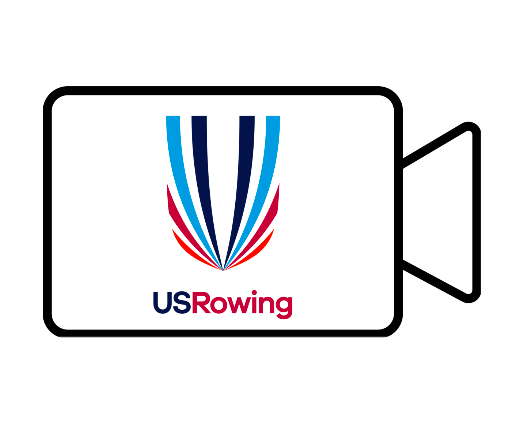STAGE 3 - Train, Compete
Chronological Age: 13-19
Target Audience: Competitive Junior
Stage 3 rowers may have a wide range of abilities, maturity levels, and desire for training and competition. Coaches should assess where athletes are in their developmental process and guide them towards appropriate training and competition challenges.
Some Stage 3 rowers earlier in their development should participate in a less intense regatta schedule, since frequent competition and travel may disrupt training and skill development. At-home skill exhibitions, recurring time trials, and local competitions (including local, state, and regional championships) are suitable competitive options. Stage 3 rowers with more experience can participate in more challenging races and regattas that inspire motivation and improve competitive ability. This might include more frequent competition, more travel, and select regional- and national-level regattas.
Concepts

Use multi-sport play for cross-sport development
Stage 3 rowers should not attempt to participate in two sports in a single season. The training workload may be too high to maximize performance and increase risk of injury or burnout.
Coaches may continue to use multi-sport play to supplement rowing and develop multiple aspects of athletic ability. Stage 3 rowers also may participate in other sports for enjoyment or to complement rowing-specific training, such as swimming in the winter off-season or cycling during the summer off-season.

Participate in a fun, structured and ongoing training program
Fun: Coaches should introduce fun activities throughout the season to support social development, recovery, and rejuvenation.
Structured: Coaches should plan practices, training sessions, and competitions ahead of time, and communicate the priorities for each component. Coaches should develop and instruct a consistent technical model of stroke performance.
Ongoing: Coaches should adapt training plans as athletes age, progress, and demonstrate increased training capacity. They should also enable Stage 3 rowers to be comfortable discussing technique during video review and in pre/post-practice meetings.

Understand performance with different maturation rates
The age range of Stage 3 rowers’ is 13-19, encompassing multiple stages of puberty. Since rowing can be challenging for the “late-bloomer” athlete, coaches need to understand that early competitive success is not a predictor of future competitive success. Coaches should provide as many participatory opportunities as possible to keep early Stage 3 rowers involved with rowing. Differentiating athletes by speed is only appropriate for late Stage 3 rowers if these methods are thoughtfully implemented in the training plan.
Foundations
SEEK OPPORTUNITIES TO DEVELOP SKILLS
Coaches should integrate creative, daily challenges into practice that are unique to their training environments. Coaches may use more advanced drills and technical sessions than in Stage 2, given the older age group and competitive focus of the athletes. Coaches should provide improvement-oriented assessments of technique proficiency and physiology to track individual athlete improvement. The tone of any formal critique should be positive and come with clearly defined steps for improvement.
FOLLOW A CONSISTENT TRAINING SCHEDULE
Stage 3 rowers should use a year-long training plan, dividing the year into smaller training blocks with specific goals for each one A periodized training plan accounts for different phases of training over the year – including modifications for multi-sport athletes – with the goal of developing certain athletic qualities at differing times while maintaining a base in others, and avoiding overtraining. This approach is critical to long-term performance and well-being.
INCREASE SPORT-SPECIFIC TRAINING AND COMPETITION SKILLS
Stage 3 rowers should target improving aerobic capacity, VO2 max, cardiovascular endurance, anaerobic fitness, and strength. Coaches of Stage 3 rowers should learn these elements of performance, how to train them, and how to create an appropriate training plan that develops these qualities on a weekly, monthly, seasonal, and yearly basis through periodization.
Stage 3 rowers should learn specific skills of racing performance, including race planning, starts, pacing, sprints, and passing that can then be applied to the parameters of each race they enter.
UTILIZE MORE SPORT-SCIENCE RELATED INFORMATION SUCH AS NUTRITION AND SPORT PSYCHOLOGY
As Stage 3 rowers develop and increase their capacity for training, additional skills are necessary to sustain and facilitate their adaptation process. This includes rowing-specific nutritional guidance to keep the body appropriately fueled and sports psychology to help manage stress. Coaches may bring in experts from these fields on an occasional basis (i.e., clinics and workshops) or as support staff for their rowing program.
PARTICIPATE IN DEVELOPMENT CAMPS
USRowing offers development camps and other events for a variety of rowers in Stage 3. Coaches of Stage 3 rowers should be aware of state, regional, and national opportunities, and encourage rowers to participate in the events appropriate to their skill level and aspirations. Participation in these programs is not required for future success in rowing. USRowing has designed opportunities for young rowers to experience different coaching, learn from new resources, and connect with rowers from other geographical areas.
COMPETE IN MORE CHALLENGING SITUATIONS
Stage 3 rowers should gain experience in more challenging competitive situations (i.e., head races or 2000 meter racing). Coaches should continue to introduce, communicate, and guide rowers through these competitions to offer support and motivation for long-term development.
Stage 3 rowers also should learn how to compete on different waterways, in different regions, and against different competitors. These are not only important from a rowing and racing perspective but also as a tool to teach competitive skills for future racing, such as personal preparation, travel management, on-the-road nutrition, and navigating warm-up areas.
Stage 3 rowers may move to Stage 4 after age 17. Stage 4 is for competitive high school seniors, collegiate rowers, and high-performance rowers in the national team system. A Stage 3 rower also can graduate high school and go to Stage 5 as a mentor (coach, official, etc.) or rower for life.
Foundations
SEEK OPPORTUNITIES TO DEVELOP SKILLS
Coaches should integrate creative, daily challenges into practice that are unique to their training environments. Coaches may use more advanced drills and technical sessions than in Stage 2, given the older age group and competitive focus of the athletes. Coaches should provide improvement-oriented assessments of technique proficiency and physiology to track individual athlete improvement. The tone of any formal critique should be positive and come with clearly defined steps for improvement.
FOLLOW A CONSISTENT TRAINING SCHEDULE
Stage 3 rowers should use a year-long training plan, dividing the year into smaller training blocks with specific goals for each one A periodized training plan accounts for different phases of training over the year – including modifications for multi-sport athletes – with the goal of developing certain athletic qualities at differing times while maintaining a base in others, and avoiding overtraining. This approach is critical to long-term performance and well-being.
INCREASE SPORT-SPECIFIC TRAINING AND COMPETITION SKILLS
Stage 3 rowers should target improving aerobic capacity, VO2 max, cardiovascular endurance, anaerobic fitness, and strength. Coaches of Stage 3 rowers should learn these elements of performance, how to train them, and how to create an appropriate training plan that develops these qualities on a weekly, monthly, seasonal, and yearly basis through periodization.
Stage 3 rowers should learn specific skills of racing performance including race planning, starts, pacing, sprints, and passing that can then be applied to the parameters of each race they enter.
UTILIZE MORE SPORT-SCIENCE RELATED INFORMATION SUCH AS NUTRITION AND SPORT PSYCHOLOGY
As Stage 3 rowers develop and increase their capacity for training, additional skills are necessary to sustain and facilitate their adaptation process. This includes rowing-specific nutritional guidance to keep the body appropriately fueled and sports psychology to help manage stress. Coaches may bring in experts from these fields on an occasional basis (i.e., clinics and workshops) or as support staff for their rowing program.
PARTICIPATE IN DEVELOPMENT CAMPS
USRowing offers development camps and other events for a variety of rowers in Stage 3. Coaches of Stage 3 rowers should be aware of state, regional, and national opportunities, and encourage rowers to participate in the events appropriate to their skill level and aspirations. Participation in these programs is not required for future success in rowing. USRowing has designed opportunities for young rowers to experience different coaching, learn from new resources, and connect with rowers from other geographical areas.
COMPETE IN MORE CHALLENGING SITUATIONS
Stage 3 rowers should gain experience in more challenging competitive situations (i.e., head races or 2000 meter racing). Coaches should continue to introduce, communicate, and guide rowers through these competitions to offer support and motivation for long-term development.
Stage 3 rowers also should learn how to compete on different waterways, in different regions, and against different competitors. These are not only important from a rowing and racing perspective but also as a tool to teach competitive skills for future racing, such as personal preparation, travel management, on-the-road nutrition, and navigating warm-up areas.
Stage 3 rowers may move to Stage 4 after age 17. Stage 4 is for competitive high school seniors, collegiate rowers, and high-performance rowers in the national team system. A Stage 3 rower also can graduate high school and go to Stage 5 as a mentor (coach, official, etc.) or rower for life.
